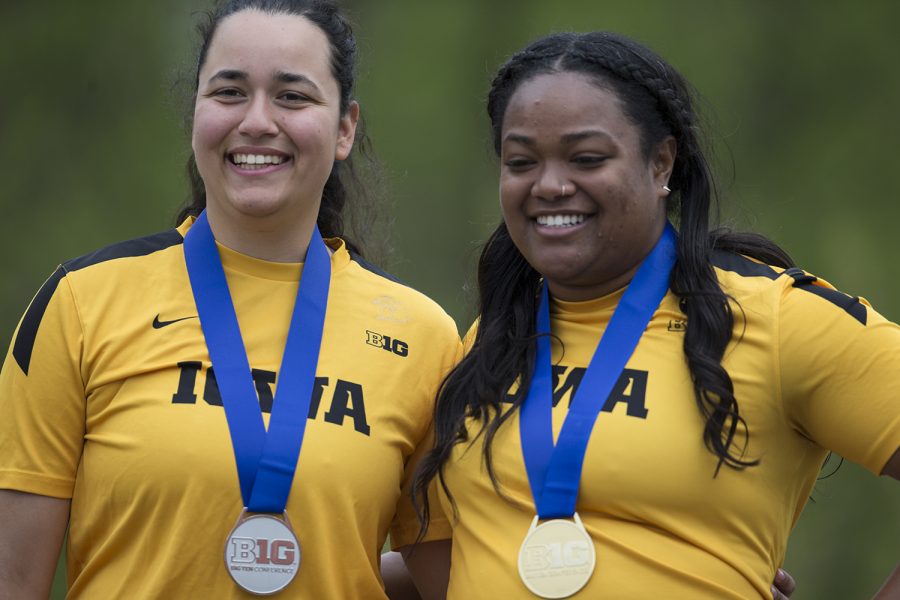A first attempt at a senior season
May 11, 2021
Ezazul Haque for The Daily Iowan
University of Iowa sophomore, Konstadina Spanoudakis (left) and Junior, Laulauga Tausaga (right), receive medals for competing in the women’s discus during the third day of the Big Ten Track and Field Outdoor Championships at Cretzmeyer Track on Sunday, May 12, 2019. Laulauga Tausaga placed first, and Konstadina Spanoudakis placed second in women’s discus.
Tausaga completed her pre-meet lifting routine on March 12 of last year, and her throwing uniform rested on her hotel bed in Albuquerque, New Mexico, ready to be worn the next day at the 2020 NCAA Indoor Track and Field Championships.
Before locking into the challenges the event would present, Tausaga and Werskey scanned the area for a sandwich shop. Traveling to a local eatery while on location at an away meet has become a tradition for Werskey, Tausaga’s coach since 2017, and his throwing group.
“I like to get out and experience the flavors of the town we are in if time permits it,” Werskey said. “So typically sandwich shops and coffee shops tend to be the go-to move. There’s been a few where [Tausaga] is like, ‘Coach I don’t know where you’re taking me, but I trust your palate.’”
Ahead of the final indoor NCAA meet of her Hawkeye career, Tausaga was in contention to win titles in the shot put and the weight throw.
A week earlier, the right-handed thrower was named the Midwest Regional Female Field Athlete of the Year by the United States Track and Field and Cross Country Coaches Association for the second year in a row, becoming the first athlete in program history to earn that honor in back-to-back years.
Around the same time, three Hawkeyes — wrestler Spencer Lee, men’s basketball player Luka Garza, and women’s basketball player Kathleen Doyle — earned Big Ten Athlete of the Year honors in their sports. But while fans publicly praised those athletes for their accomplishments, Tausaga’s teammates were forced to come to her defense, commenting on Twitter posts where Tausaga wasn’t mentioned alongside her peers.
Track athletes deserve better recognition. Tired of being forgotten. Thank you @BrendanThompsn. https://t.co/iqpPtofDZR
— Laulauga Tausaga (@LaulaugaTausaga) March 10, 2020
But Tausaga wasn’t going to let the lack of recognition get the best of her. It was nothing new to her, or many track and field athletes overshadowed by more “mainstream” U.S. sports. The focus instead was on the competition ahead.
Until both Tausaga and Werskey received a notification.
Werskey turned his phone to Tausaga at the sandwich shop table and said “I’m really sorry.” Tausaga saw a message from Iowa director of track and field Joey Woody on the screen. An immediate team meeting was called, and the Hawkeyes were heading back to Iowa City that night.
“I was about to just demolish this sandwich,” Tausaga said, “and I remember instead of eating, I was crying.”
The Big Ten had announced that, in response to growing concerns over COVID-19, its teams would not be participating in NCAA championship events. Throughout the rest of the day, all spring sport seasons were canceled.
Werskey drove a heartbroken Tausaga back to the team hotel. Tausaga, feeling near the point of hyperventilating, says she tried not to distract Werskey in the driver’s seat as she processed what had just been lost.
Her last collegiate indoor season was over. A chance to become a back-to-back national champion in the discus was, at the time, crushed when the outdoor season was canceled. Eventually, the U.S. Olympic Track and Field Trials Tausaga had qualified to compete at in the discus were pushed back a year.
The podiums Tausaga had goals of standing atop now seemed so far away.
At that moment, Tausaga and her fellow seniors didn’t know if their Hawkeye careers had just ended.
“We were shutting down, heading home and everything was done,” Woody said. “I was like, ‘Is this really the end? This is how we’re going to end it with these seniors?’ There were a lot of tears and there was a lot of disappointment. I was scared to hug people, even if I wanted to hug them.”
The pandemic canceling the rest of the 2020 season could have been the end to a stint in Iowa City Tausaga didn’t even want to happen at first.
